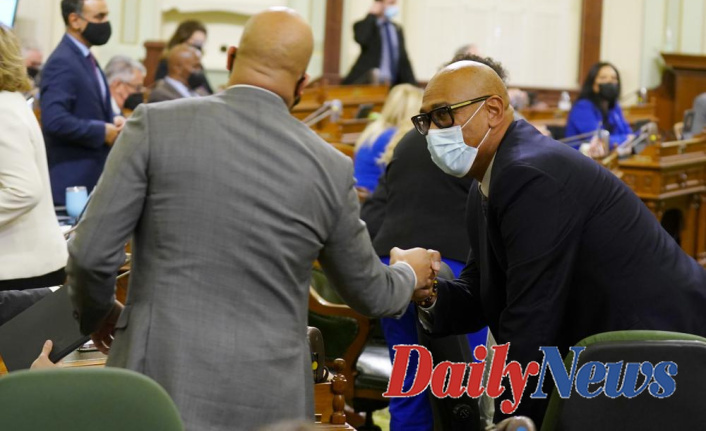She said, "My check was literally $86." "I was like, "Oh my God."
Orozco could soon receive backpay from her employer for time she was sick. On Monday, the California Legislature will vote on a bill to require that most companies give their employees two weeks paid leave if they are sick with coronavirus. The proposal would also be retroactive to January 1.
State and federal laws required that employers provide paid time off to their employees if they were sick with the coronavirus at the start of the pandemic. Many of these laws have since expired. California's law was repealed last September.
Labor unions pressed state officials to reinstate the law and Democratic Governor after the omicron virus caused a surge in new cases. Gavin Newsom and legislative leaders reached an agreement to do so.
Orozco is a member Fight for $15, which advocates for $15 minimum wage and union rights for fast-food workers. Orozco claimed she was denied time off for being sick.
According to the complaint filed by workers with the state and local authorities, at least six of 16 employees of her restaurant had coronavirus symptoms. Orozco stated that the complaint is still pending.
Orozco claimed that her husband and she had to forgo their car insurance payments and borrowed money to pay their rent. She said that if the Legislature approves the law, it would allow her to "konw that I'm able pay back my family who allowed me to borrow that money."
She stated, "It's going help everyone in the same industry (that is) tight on cash,"
California will be the fourth state to mandate paid time off for employees who contract the coronavirus. According to the National Conference of State Legislatures, similar mandates still exist in Massachusetts, Colorado, and New York.
Additionally, five states, Washington, New Jersey and Oregon have laws on paid sick leave that are not COVID-specific but can be used to cover coronavirus time.
Businesses strongly opposed the laws, saying that they forced employers to cover the costs of the pandemic.
However, in a separate vote on Monday, California lawmakers are expected to approve tax cuts for businesses which will save them approximately $5.5 billion.
The tax cut was originally scheduled for the end of 2011, but lawmakers will vote to make it effective one year earlier. This move was supported by business groups who previously opposed paid sick leave laws, arguing that it would be too costly for employers.
The California Chamber of Commerce stated that it supports the sick-leave proposal because it "is a balanced approach to protect both workers' and our economy."
Jennifer Barrera, President and CEO of California Chamber of Commerce, stated that "healthy employees and healthy customers are good business."
California's sick leave proposal offers workers up to one week of paid sick time if they contract the coronavirus, or care for a family member who is sick. If they or their relatives test positive, they can receive a second week of paid time off. Employers must pay for the test and provide it. This proposal is only applicable to companies that have 26 or more employees. It expires on September 30.
The coronavirus' omicron variant prompted an increase in new cases and hospitalizations. This was mostly due to the unvaccinated state population. The state's seven-day average of over 118,000 cases was the highest since the outbreak. This January, the number of cases reached its peak.
Hospitalizations also increased but not to the same extent as before, which indicates that the omicron variant wasn't as severe. Newsom still asked for more money from the Legislature to respond to the surge.
Last year, Newsom received $1.7 billion from lawmakers to help pay for the virus. On Monday, lawmakers will vote to increase that amount to $1.9 billion.
This money can be used to pay for testing, vaccine distribution, and staffing in hospitals.
Erika Li, chief deputy at California Department of Finance, stated that "that just, I believe, proves how much we didn’t know." When lawmakers approved the budget last fiscal year, Erika Li said, "That just, i think, proves to the point of what we didn’t know." "Delta (variant), may have been on our horizon, but omicron wasn't. This is the state's response.












